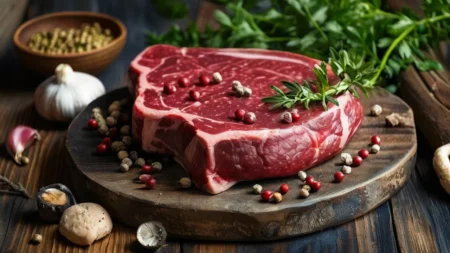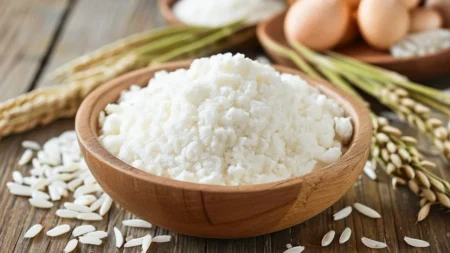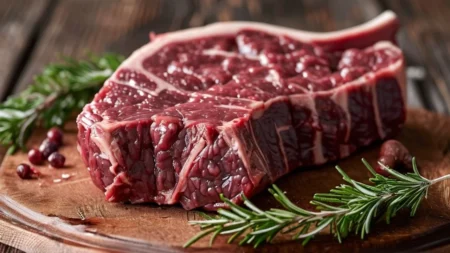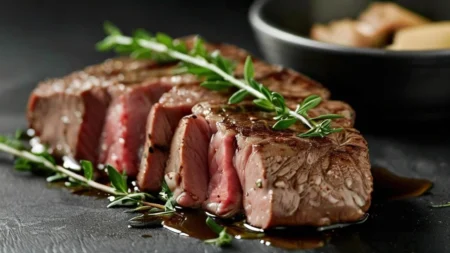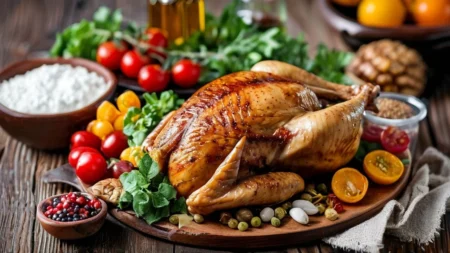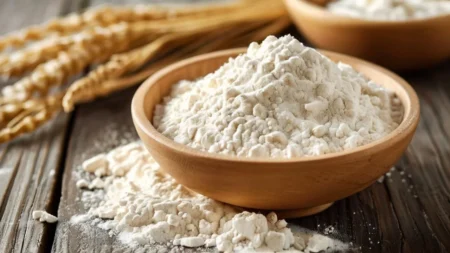Chia Seeds: Nutrition, Health Benefits, and Uses
Key Takeaways:
- Chia seeds are a superfood rich in fiber, omega-3 fatty acids, protein, and essential nutrients.
- These seeds offer numerous health benefits, including improved digestion, heart health, and weight management.
- Chia seeds are versatile in cooking, ideal for smoothies, salads, baking, and making chia pudding.
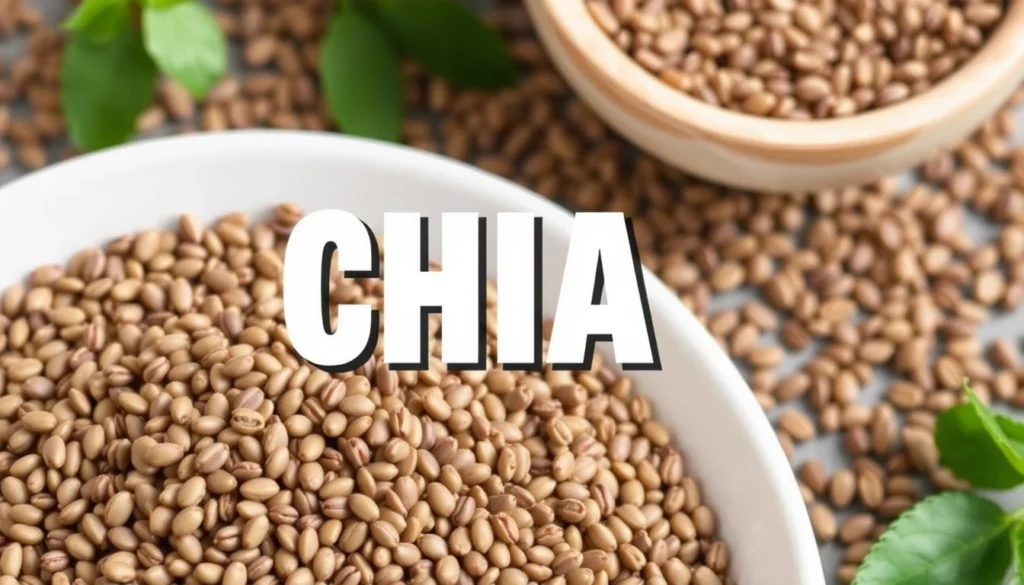
What Are Chia Seeds?
Chia seeds are tiny, edible seeds from the plant Salvia hispanica, a flowering plant in the mint family native to Central America. Despite their small size, chia seeds are packed with nutrients and are widely recognized as a superfood. Their ability to absorb water and form a gel-like substance makes them popular in recipes like chia pudding and smoothies.
Nutritional Breakdown per 1 Ounce (28 grams) of Chia Seeds
| Nutrient | Amount |
|---|---|
| Calories | 137 kcal |
| Protein | 4.7 grams |
| Fiber | 10.6 grams |
| Fat | 8.6 grams |
| Omega-3 Fatty Acids | 4.9 grams |
| Calcium | 177 mg (18% DV) |
| Magnesium | 95 mg (23% DV) |
| Phosphorus | 244 mg (24% DV) |
Health Benefits of Chia Seeds
Chia seeds are loaded with essential nutrients that offer a range of health benefits, making them an excellent addition to a balanced diet.
1. Rich in Fiber for Digestive Health
Chia seeds are incredibly high in dietary fiber, which promotes healthy digestion and helps prevent constipation. Just one ounce of chia seeds provides over 40% of the recommended daily fiber intake.
2. High in Omega-3 Fatty Acids
Chia seeds are one of the richest plant-based sources of omega-3 fatty acids, which are crucial for heart health. Omega-3s help reduce inflammation, lower cholesterol, and decrease the risk of heart disease.
3. Supports Weight Management
The high fiber content in chia seeds helps promote satiety, making you feel fuller for longer. This can aid in weight management by reducing overall calorie intake. When chia seeds absorb water, they expand in the stomach, further enhancing feelings of fullness.
4. Rich in Antioxidants
Chia seeds are packed with antioxidants that protect your body from harmful free radicals. Antioxidants can help reduce the risk of chronic diseases and contribute to healthy skin by slowing down the aging process.
How to Use Chia Seeds in Your Diet
Chia seeds are extremely versatile and can be incorporated into a wide variety of dishes. Their ability to absorb liquid makes them useful as a thickening agent in recipes.
1. Chia Pudding
Chia pudding is one of the most popular ways to consume chia seeds. Simply mix chia seeds with your favorite liquid (almond milk, coconut milk, etc.) and let them sit overnight in the fridge. The seeds will absorb the liquid and form a pudding-like consistency.
Ingredients:
- 3 tablespoons chia seeds
- 1 cup almond milk (or any liquid)
- Sweetener to taste (optional)
Instructions:
- Combine chia seeds and liquid in a bowl.
- Stir well to ensure the seeds are evenly distributed.
- Refrigerate for at least 4 hours, preferably overnight, until it forms a thick pudding.
2. Smoothie Boost
Add a tablespoon of chia seeds to your smoothie for an extra dose of fiber, protein, and omega-3s. They add texture without altering the taste.
3. Baked Goods
Chia seeds can be incorporated into bread, muffins, and cookies. You can also use them as an egg substitute in vegan baking by mixing 1 tablespoon of chia seeds with 3 tablespoons of water to create a gel-like consistency.
4. Salad Topping
Sprinkle chia seeds on top of salads for a slight crunch and nutritional boost. They pair well with leafy greens, fruits, and vinaigrettes.
Chia Seeds in History and Culture
Chia seeds have been cultivated for thousands of years, particularly in ancient civilizations like the Aztecs and Mayans. They were prized for their ability to provide long-lasting energy and were often referred to as “warrior food” because Aztec soldiers consumed them before battle.
Chia in Modern Diets
Chia seeds are now a staple in many diets, particularly among health-conscious consumers. They are popular in vegan, paleo, and gluten-free diets due to their nutrient density and versatility in both sweet and savory dishes.
Chia Seeds vs. Other Superfoods
Chia seeds are often compared to other nutrient-dense foods like flaxseeds and hemp seeds. Here’s how they stack up:
1. Chia Seeds vs. Flaxseeds
Both chia and flaxseeds are high in omega-3 fatty acids and fiber. However, flaxseeds need to be ground for optimal nutrient absorption, while chia seeds can be eaten whole. Chia seeds also contain more fiber than flaxseeds.
2. Chia Seeds vs. Hemp Seeds
Hemp seeds are richer in protein than chia seeds, but chia seeds have more fiber. Both are excellent sources of omega-3 fatty acids, but hemp seeds also contain omega-6 fatty acids.
Potential Side Effects of Chia Seeds
While chia seeds are generally safe for most people, consuming too many may cause digestive issues, such as bloating or constipation, due to their high fiber content. It’s recommended to start with a small amount and increase gradually while ensuring adequate water intake.
Choking Hazard Warning
Since chia seeds absorb liquid and expand, eating them dry without enough liquid could pose a choking hazard. It’s important to consume chia seeds with adequate fluids to allow proper absorption and digestion.
Conclusion
Chia seeds are a nutrient powerhouse, packed with fiber, omega-3 fatty acids, protein, and essential vitamins. Whether you’re looking to improve digestion, boost heart health, or support weight management, chia seeds are a versatile and easy-to-use addition to any diet. From chia pudding to smoothies, these tiny seeds offer a big nutritional punch that can benefit your overall well-being.
FAQ
Q: How many chia seeds should I eat per day?
A: A common recommendation is 1–2 tablespoons (about 15–30 grams) of chia seeds per day. This provides ample fiber, protein, and omega-3 fatty acids.
Q: Can chia seeds help with weight loss?
A: Yes, chia seeds can support weight loss due to their high fiber content, which helps you feel full and satisfied, potentially reducing overall calorie intake.
Q: Are chia seeds gluten-free?
A: Yes, chia seeds are naturally gluten-free, making them a great option for those with celiac disease or gluten intolerance.
Q: Can I eat chia seeds raw?
A: Yes, chia seeds can be eaten raw, but it’s best to consume them with liquids, as they absorb water and expand. This makes them easier to digest and safer to consume.
Q: Do chia seeds need to be soaked before eating?
A: Chia seeds don’t need to be soaked, but soaking them in liquid allows them to form a gel, which may improve digestibility and texture, especially in recipes like chia pudding.





